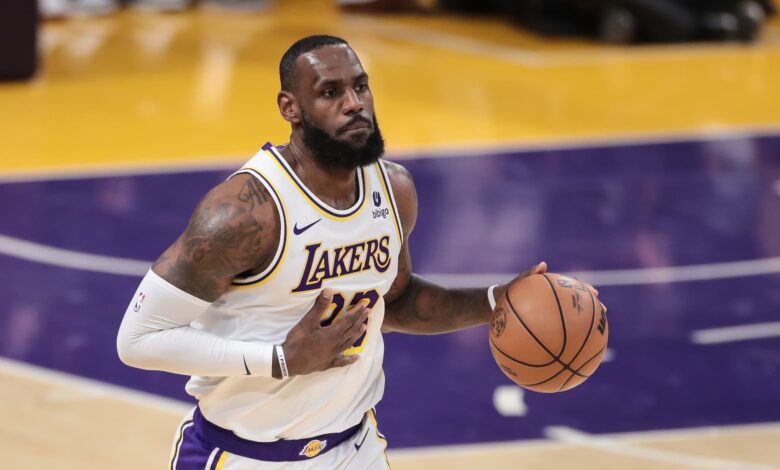New sports streaming platform: What to know

Los Angeles Lakers forward LeBron James, #23, during the NBA game between the Los Angeles Clippers and the Los Angeles Lakers at Crypto.com Arena in Los Angeles on Jan. 7, 2024.
Jevone Moore | Icon Sportswire | Getty Images
The U.S. media world was rushing — or panicking? — Wednesday to try to figure out the ramifications of Disney, Warner Bros. Discovery and Fox‘s new joint venture, an unprecedented move to work together in the years since media companies broke out their own competing streaming platforms.
The service will launch this fall and cater to sports fans who don’t subscribe to the traditional cable bundle. Consumers will have access to all of the networks owned by those companies that carry sports, along with Disney’s ESPN+.
Some of the motivations for the companies are clear, as they look to sports to help drive streaming profits. Other reasons for launching the product are murkier and more company specific.
Many media executives are scrambling for answers about a deal that could have major ripple effects in the industry.
What’s the audience?
At first glance, the venture is a big concern for the three largest pay TV operators, Charter, Comcast and DirecTV.
But just how much they stand to lose is murky. One person associated with the launch of the new venture told CNBC the platform will be “a monster” and massively disrupt cable TV.
That’s possible. Some percentage of people who eventually sign up for the sports bundle will cancel traditional cable in favor of the new, cheaper alternative. The price for the new product hasn’t been determined, but sources told CNBC it will be higher than $30. One person said $45 to $50 per month seemed logical after discounted introductory offers expire.
A product around $40 a month is much cheaper than the $72.99 per month for YouTube TV, which is now a growing cable alternative for sports fans.
But it’s also possible the platform simply doesn’t have a huge audience. There’s a reason tens of millions of Americans have canceled cable. Many simply don’t want access to sports and the associated cost.
Fox CEO Lachlan Murdoch said Wednesday that the product is geared toward people who have never signed up for cable. But it’s a leap of faith to assume a lot of these people want to spend $40 or so each month for live sports.
Spokespeople for Charter, Comcast and DirecTV all declined to comment on the new offering.
Charter and Comcast haven’t really cared about video defections for years now. Broadband is a far more profitable product. Cable TV has been relegated to an add-on that helps keep people subscribing to high-speed internet.
But broadband subscriber growth has stalled for both Comcast and Charter as Verizon, T-Mobile and AT&T have rolled out 5G home and fixed wireless broadband products. That makes additional loss of video subscribers potentially more harmful for the companies.
Satellite TV providers DirecTV and Dish, which don’t have high-speed broadband products at all, are potentially more at risk — so are virtual distributors of linear networks, such as Google‘s YouTube TV, FuboTV and Hulu with Live TV, which is owned by Disney.
The Disney, Warner Bros. and Fox service isn’t a full sports offering. It doesn’t include NBC or CBS, which both broadcast a lot of sports, including the all-important National Football League. Granted, NBC and CBS are free over the air with a digital antenna, and both offer streaming services — NBC’s Peacock and CBS’ Paramount+ — that already include sports.
Still, the more consumers feel they need to add on to this service, the greater the cost and hassle, and the less appealing it becomes.
Now that the joint venture exists, perhaps the distributors can also eventually get more flexibility to offer similar skinny bundles.
There’s another dynamic at play: ESPN is still planning to launch a full direct-to-consumer offering in the fall of 2025, CEO Bob Iger said Wednesday. That product will also have an audience.
It remains to be seen just how many people subscribe to the new platform. Maybe it’s a game changer, maybe it’s not.
What does this mean for news?
Traditional pay TV still has about 70 million subscribers. That includes so-called “virtual MVPDs,” like YouTube TV, which just announced it has more than eight million subscribers.
The cable bundle has largely survived because it still contains exclusive live news and sports.
Now there’s a cheaper way to access most of the sports, and it doesn’t include cable news networks such as Fox News, CNN, MSNBC and CNBC. The shift could pose a threat to those channels, which are now at risk of losing subscribers.
Could the news networks gang up to offer a skinny news bundle, in a similar fashion to the new sports bundle? Or will the new sports venture be a catalyst to news bundles, a concept CNBC has written about for many years, but hasn’t happened? Could Fox News bundle with other conservative-leaning publications? Could CNBC partner with The Wall Street Journal or the Financial Times to offer a print and video combination?
These are hypotheticals, but the sports package may force executives to think in new ways.
Warner Bros. Discovery and Disney trade-offs
LightShed media analyst Rich Greenfield called the new sports platform “the Winners’ bundle.” To some degree, he has a point. Customers for this new platform will keep paying Disney, Warner Bros. and Fox for content, and they won’t be paying NBCUniversal and Paramount Global.
But it also brings risks for Warner Bros. and Disney.
Warner Bros. has unbundled TNT, TBS and TruTV from the rest of its networks with the skinny bundle. That may prompt pay TV distributors to demand they only pay for the same package, putting many of the old Discovery networks at risk, including HGTV, Animal Planet, TLC and the Discovery Channel. These are low-cost, profitable channels for Warner Bros.
Those that want the Discovery networks can always subscribe to Max. All the content is already there.
Fox faces less risk. Cable providers will probably still need Fox News to placate the network’s rabid fan base.
Disney’s flagship ESPN streaming service now feels muted by this new sports offering. Previously, the only way for cord cutters to get ESPN outside the cable bundle would have been that coming service. Now, the new platform will also give cord cutters a cheaper way to get ESPN.
The joint venture will require Disney to split revenue with two other companies. Disney’s direct-to-consumer offering is all Disney. The launch of the platform seems to be at best a hedge and at worst a critique of the potential popularity of an expensive ESPN-only streaming product.
One possible way Disney can add some juice to its own direct-to-consumer product is if the three-company sports platform comes with limited or no on-demand options. But if that’s true, it may decrease the appeal of the joint venture.
David Zaslav’s merger campaign
Part of the rationale behind this announcement comes down to competitive dynamics. There has never been any love lost between Disney and Comcast.
It probably shouldn’t be a surprise that the product wasn’t a shared venture between those two companies after years of disagreements on the direction of Hulu. Ownership of the product is still split between the companies as valuation discussions plod along to make the service wholly owned by Disney.
The structure also can be seen as a not-so-subtle jab at Paramount Global and NBCUniversal from Warner Bros. CEO David Zaslav, who may have interest in merging with either or both companies.
The message from him to Paramount Global and NBCUniversal is clear: You’re not strong enough on your own anymore. Not inviting either company to the sports platform party is a signal that Iger and Zaslav feel the programming from NBCUniversal and Paramount Global is simply not needed.
If the joint venture does turn out to be a “monster,” Zaslav may have just earned himself some leverage in future merger discussions.
Disclosure: Comcast’s NBCUniversal is the parent company of CNBC.
WATCH: ESPN should have been in a sports bundle “from the beginning,” says Lightshed’s Rich Greenfield
Don’t miss these stories from CNBC PRO:
Source link



